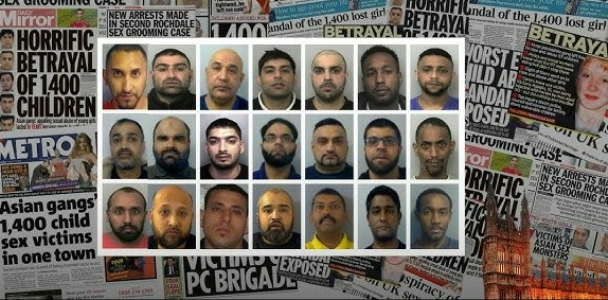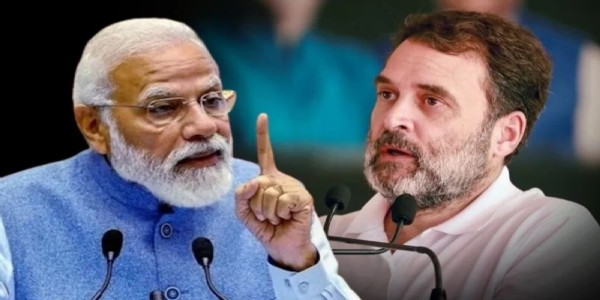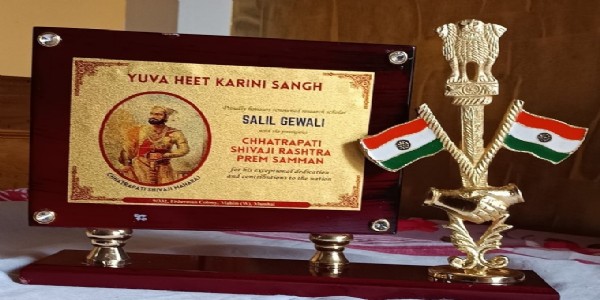Comrade Yechury Ko Gussa Kyon Aata Hai (Comrades’ Ire)
The comrade sees red in any hue of saffron. The biggest mistake of our comrades is their refusal to see the spiritual underpinning and cultural unity of this great country.
Total Views |
Comrades these days are very angry. Their fight against the bourgeoisie hasn’t reached anywhere in 100 years. The subaltern Hindu that had been kept quiet using Nehruvian heft and abuse has risen and doesn’t give a damn to their fulmination and name-calling. Any action, any law, any scheme that sees their proletariat rise in their lives makes them see red. It is like a bull seeing a red rag.
Every word of RSS and BJP is seen through a microscope and underlined with red strokes to check how far they have moved from the ‘Nehruvian consensus’ – an evocative term to show the hold of Left elite using Nehru and his daughter as their allies to rewrite history and hijack the future.
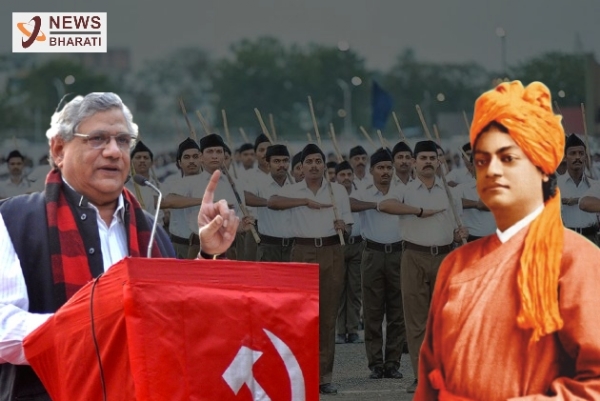
Today, Twitter was kind enough to show me a tweet by Comrade Yechury who is fighting a battle within Marxist camp. Obviously, the following sheet of “Samachar” by the PIB has riled the comrade no end.
By claiming that Swami Vivekananda(born 1863) & Ramana Maharishi(b 1879) inspired the 1857 Gadhar totally exposes the absence of RSS/Hindutva forces in our freedom struggle. https://t.co/Hb5uqin0cD
— Sitaram Yechury (@SitaramYechury) January 11, 2022
Followed by his diatribe -
1. By claiming “freedom struggle was not limited to only British rule” they betray their focus always remained communal anti Muslim & never anti British.
2. Must constantly remember that leaders of 1857, Jhansi ki Rani included, proclaimed the Mughal Monarch Bahadur Shah Zafar as the Sovereign of Independent India overthrowing the British.
3. Indian people will defeat this RSS/BJP agenda to keep India in chains.
4. The concealed agenda of this Amrit Mahotsav is Modi’s efforts to smuggle in RSS/Hindutva elements as ‘heroes’ of freedom struggle when they were actually collaborating with the British.
5. Legacy of our freedom struggle is moving forward towards more equality, justice and fraternity. Azadi ✊🏾
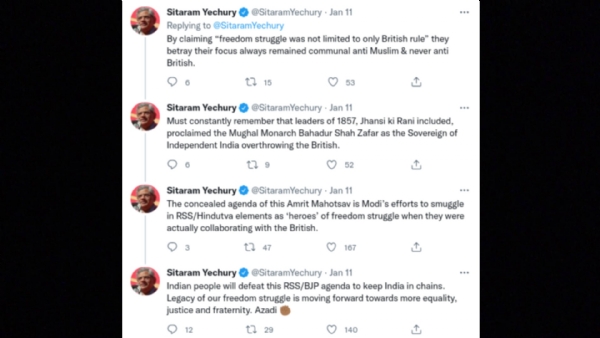
When I read the Samachar page, I realized the actual cause of this epileptic fit. The magazine says, “The freedom movement is not limited only to British rule, even before that India has gone through a period of servitude. An initiative to highlight the contribution of all those great men is on the radar.”
Holy Ass! (holy cow would be communal, so I substituted cow with ass) How dare these Hindutva fascists call the Islamic enslavement of Bharat a period of servitude! Simply not acceptable. Haven’t they been dumbed down yet to accept father-son duo of Habibs’ (no not the scissor wielding one but the pen wielding ones) that invaders had adopted this land after capturing it, looting it, sending treasures to their fatherlands, raping women, breaking temples and taxing farmers to penury? That all this canard of converting the heathens was so much of hogwash? That, they had come only for treasures of the temples and they were forced to break temples as the treasures were hidden by evil Brahmins inside the depths of the temples? Hasn’t Romila di explained that conversion was only to punish the people who refused to see the light of Allah? Raping women was only to show the heathens the power of Islam and not to ravish women. After all, as some ‘liberal’ feminazi have pointed out, who forced Rajput women to commit jauhar’, they could as well have let themselves be raped?
Comrade Gadar was 1857, RSS was born in 1925. Why so angry? Read my book on RSS role in Freedom struggle. Also yours that ratted on 1942 Quit India leaders. 😊 https://t.co/CB7HrICFuk
— Ratan Sharda 🇮🇳 रतन शारदा (@RatanSharda55) January 12, 2022
Thus, Modi inspired talk of Islamic slavery is nothing but communalising history. Comrade refuses to go beyond eminent historian’s rewritten history. An Indian (I am sorry comrade, I don’t know Chinese), proverb says, “A pigeon shuts his eyes and believes the cat has gone.” That is the situation of our comrades.
Comrade’s mentions Modi’s PIB about freedom struggle not limited to British. Yechury (I should avoid using Sitaram, lest he is reminded of his “hateful” Hindu part) has forgotten about Dutch attempt at colonising and the dark period of Portuguese occupation. Since, his party is trying to defend its last bastion in Kerala, may I humbly remind him of Battle of Collachel won by Raja Martand Verma of Thiruanantpuram in 1751? (Sorry, I mean Trivendrum – Thiruanantmpuram smells of religiosity) In this war, he broke the back of the Dutch so badly that they gave up the dreams of colonise Bharat. Perhaps it was a friendly fire for comrades, just like the peaceful Moplah pogrom against the Hindus which won them mention as freedom fighters from the Marxist historians? I could talk of many more battles against colonial powers and Islamists before 1857 happened, but I mustn’t let my enthusiasm break the limitations of an article.
Mentioning the Jesuit inquisition of Goans, who were intolerant enough not to convert, shouldn’t be remembered too because that would create hate. It is besides the point that Indian Christians have no love lost for Portuguese or their violence against them and their Hindu brethren. So, we must jump directly to the British period but must not mention the role of Communists in supporting them in 1942, nor about their advocacy of Pakistan; or theory of multi-nation India ‘united’ by British that must be broken into 17 nations before the British left. We should also not talk about Communist armed rebellion from 1947 to 1951 to follow the directive of Comrade Stalin that the independence won by India on 15 August 1947 was not true independence of the proletariat but rule of the bourgeoisie that must be overthrown.
Mention of Bhakti movement and Swami Vivekananda, Chaitanya Mahaprabhu and Ramana Maharshi in the said article is, ofcourse, the pits as far as comrades are concerned. When you talk of Bhakti movement you are basically reminding the wretched Hindus about the preservation and rejuvenation of their dharma in the darkness of Mughal oppression when no large temples were left standing in the north, no Hindu was allowed to follow his/her religion in the open and religion shrunk deep inside homes to be preserve the faith. But for the rise of Bhakti movement, Hindus would have perished as Hindus and all scriptures and knowledge lost. It was definitely also a reformist period that helped rejuvenate dharma and take it out of clutches of orthodoxy and superstition. The rise of Bhakti movement, starting from South and spreading across Bharat also showed the cultural unity of Bharat, the all pervasive Sanatan dharma that we call Hindu dharma. When you mention this period, you end up referring to Islamist oppression that is a sin for the Marxists. Because we must not remember that Hindu-Muslims lived in peace under Mughals by either converting or making peace with Jiziya.
Comrade is unhappy with mention of Swami Vivekananda who reignited the sense of pride in Bharat and Hindu dharma after the entire nation had been brutally silenced by the British after 1857 War of Independence (or Gadar as comrade prefers to call it) by butchering Indians en masse in major centres of the struggle. The deadly silence of three decades was broken by Swami Vivekananda who exhorted, “For the next fifty years this alone shall be our keynote - this, our great Mother India. Let all other vain gods disappear for the time from our minds. This is the only god that is awake, our own race - everywhere his hands, everywhere his feet, everywhere his ears, he covers everything. All other gods are sleeping. What vain gods shall we go after and yet cannot worship the god that we see all round us, the Virât? When we have worship this, we shall be able to worship all other gods.” Once, you read this ‘communal’ language of the great monk, you can understand why comrades have no love lost for Swami Vivekananda; recent attempts to secularise Swami ji notwithstanding.
We must remember that within a couple of years of his death at a young age, the spirit of freedom was rekindled due to his exertions and we saw the big uprising through ‘Bang Bhang’. There onwards the urge for freedom was unstoppable. British had to invent Congress to pacify Indians by creating a debating society and diverting their energies and focus.
It is amusing that nowhere does Samachar talk about RSS in the article. But, the comrade sees red in any hue of saffron. The biggest mistake of our comrades is their refusal to see the spiritual underpinning and cultural unity of this great country. Hence any mention of Dharma, Hindutva, Hindu or spiritualism is highly allergic to them. They haven’t learned from the success of saffron Bharatiya Mazdoor Sangh under the RSS leader Dattopant Thendgi in their red bastion of trade unionism.
May I also offer them unsolicited advice? The day they uproot themselves from Russia, China and North Korea and identify with Indian ethos and traditions, they might find deliverance. Secret of Bharatiya's philosophy is harmony not division. It is not an easy path, but as the founder of the Communist movement, M N Roy had noted, “It may be a long path, but if it is the only path, then it is the shortest path.” RSS leader Shri Guruji had told the swayamsevaks, “A shortcut will cut you short.” Dividing people, pitting one against the other, creating anarchy may seem a shortcut. But, what use is the struggle for justice if the society for which you are struggling collapses?
Our leaders have noted time and again that we learn from our history to make our future better. Keyword is ‘our history’ not Communist China’s or North Korea’s.
To know more, the author has written a book named "The Sangh & Swaraj: Role of RSS in freedom struggle"
Bharati Web




